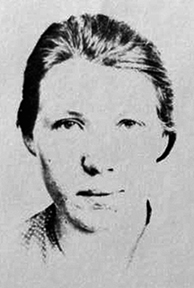Search for Names, Places and Biographies
Already layed Stumbling Stones
Suche
Berta (Bertha) Ollech * 1897
Eilbeker Weg 61 (Wandsbek, Eilbek)
HIER WOHNTE
BERTA OLLECH
JG. 1897
EINGEWIESEN 1935
ALSTERDORFER ANSTALTEN
"VERLEGT" 1943
HEILANSTALT
AM STEINHOF WIEN
TOT AN FOLGEN
11.7.1945
Bertha Ollech, born 5 Mar. 1897 in Borowen, Masuria, died 11 July 1945 at the Wagner von Jauregg Mental and Nursing Home of the City of Vienna
Eilbeker Weg 61
Bertha Ollech survived the end of the war at the mental and nursing home in Vienna, however she then died in the summer of 1945. Her last correspondence with relatives dates from Nov. 1943 so that it can be assumed that they never learned of Bertha Ollech’s death.
Bertha Ollech was born into a Protestant family in the village Borowen in Masuria in 1897. Her father Christof Ollech was an innkeeper. Her mother Henriette, née Pokropp, came from Pustnik in East Prussia where Bertha attended elementary school, completing it after eight years. She learned to sew, and in 1914 she went to Krupp in Essen "in position”. Afterwards she took jobs in Berlin, Dortmund and Hamburg. In between she returned to her home time and time again. She had four siblings, one of whom, a sister, later also lived in Hamburg-Eilbek.
Bertha Ollech then found a job ironing in a Hamburg orphanage on Averhoffstraße. She traced her later illness back to an encounter with a waiter in 1922 who was able to hypnotize people. When she broke off the relationship, he apparently threatened revenge on her. Since that time she suffered from paranoia. In spring 1928, she was admitted to the Barmbek Hospital. After a month, she was transferred to the Friedrichsberg State Asylum and released again that the summer. She returned to her previous job at the orphanage. When jobs were cut in 1930 due to an emergency decree, she became unemployed and received weekly support of 8 Marks, from which she scraped by as a tenant.
Bertha Ollech soon began to suffer from sleeplessness, vomiting, depression and fatigue. In Aug. 1931 she was treated for typhoid at St. Georg Hospital.
In 1933 Bertha was again admitted to Barmbek General Hospital for aggressive behavior, where she stayed for four months. Since her condition did not improve following her discharge, she was admitted a second time to Friedrichsberg State Asylum on 6 Nov. that same year. From there she was diagnosed with "schizophrenia” and moved on 26 Apr. 1935 to what at the time was called the Alsterdorfer Asylum.
Upon her admission, she was very withdrawn and uneasy. She suffered from paranoia. A nurse was called in to act as her guardian in her pension matters. During the summer she spent excessive amounts of time caring for her body, especially by bathing extensively in warm water. She often took walks and as she did she laughed and talked to herself and hallucinated. She became more difficult to deal with, shirked her work and frightened her fellow patient with her unfriendliness. In 1936 a sterilization assessment was compiled, but had no consequences.
While Bertha Ollech had taken such thorough care of herself in the beginning, she later neglected herself more and more. Sporadically she recognized her delusions and hallucinations for what they were, but mostly she wandered around restlessly, fought with other patients and once even became violent. As during a previous fit, she was placed in the observation hall to calm her down (see Harry Becker). After returning to her ward, she isolated herself from the others without engaging in any activity. The nurses were not able to integrate her.
In Aug. 1943 the asylum management moved part of the residents, both male and female, to another mental and nursing facility. Bertha Ollech was assigned to a transport of 228 women and girls to the Wagner von Jauregg Mental and Nursing Asylum of the City of Vienna. During her admission consultation there on 17 Aug. 1943, she sat across from the doctor with a motionless face, first answering his questions clearly, then in a barely audible voice, insisting that she did not feel hypnotized.
After six weeks of settling in, she behaved as hostily as she had previously at Alsterdorf. Her body weight dropped from 62 kg in Oct. 1943 to 42 kg in Apr. 1945. Bertha Ollech died on 11 July 1945, allegedly from enterocolitis, severe diarrhea, after she had been administered an intelligence test on 27 June. Actually Bertha Ollech was slowly killed by being deprived of food and medical care after the end of the war.
Translator: Suzanne von Engelhardt
Kindly supported by the Hermann Reemtsma Stiftung, Hamburg.
Stand: January 2018
© Hildegard Thevs
Quellen: Ev. Stiftung Alsterdorf, Archiv, V 135; Wunder, Exodus in: Wunder, Genkel, Jenner, Auf dieser schiefen Ebene.


